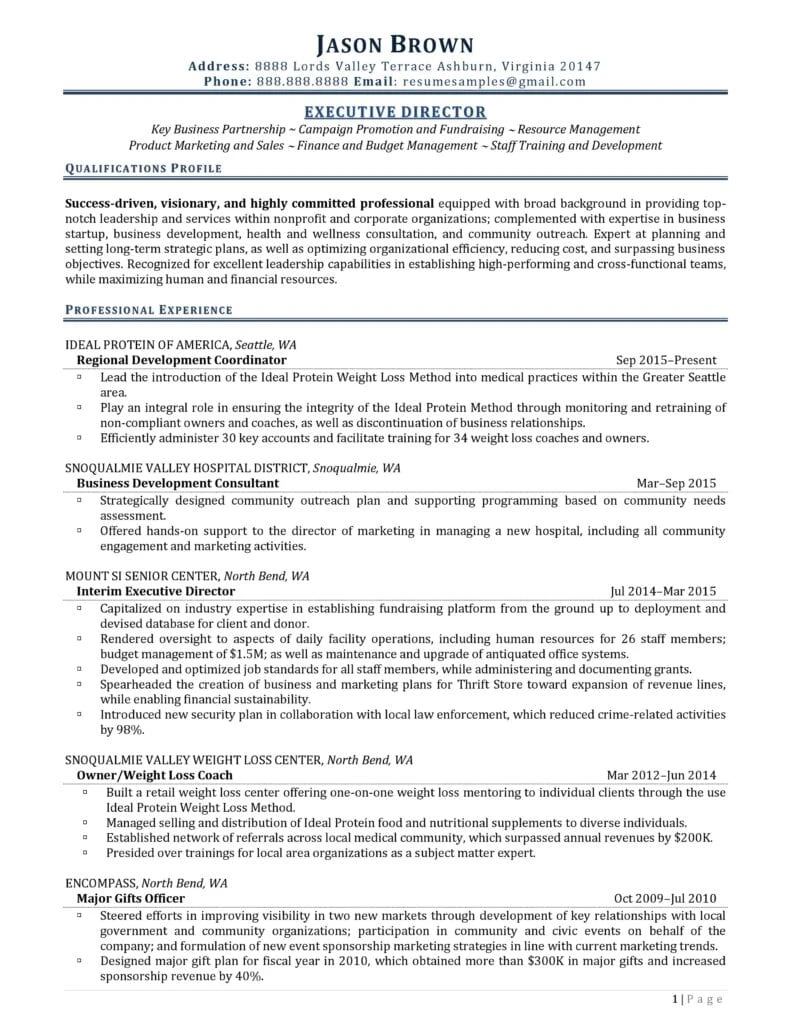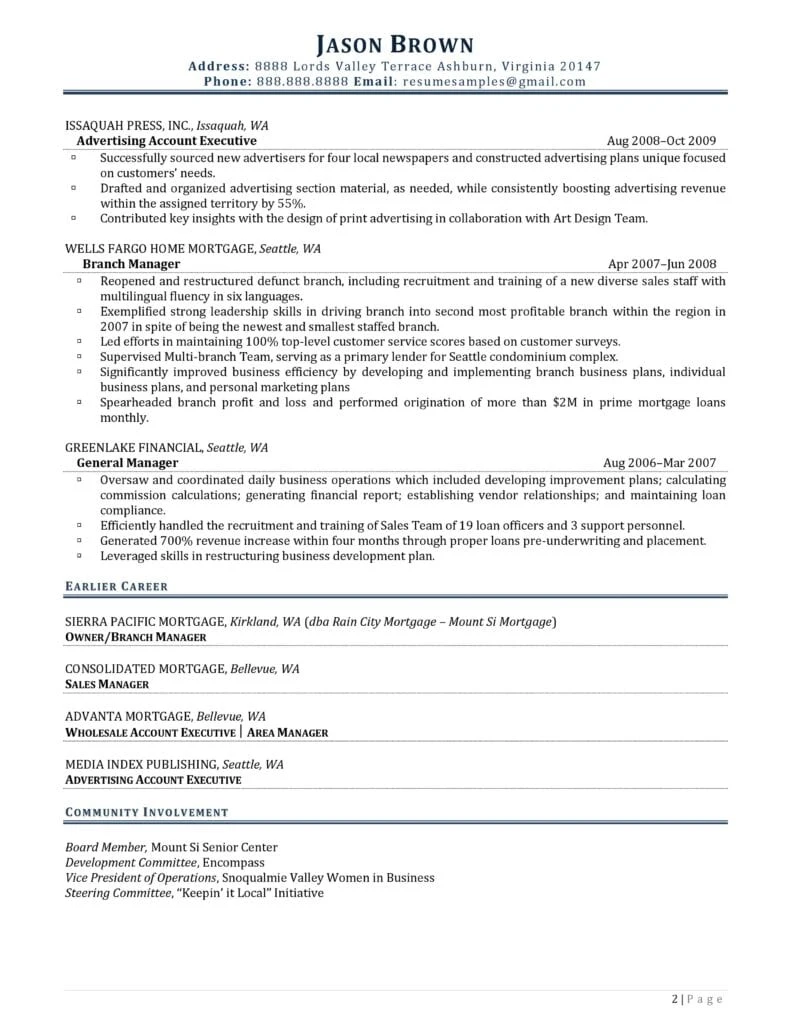For aspiring professionals, landing an executive director position ranks among their professional goals. However, securing this job could pose a challenge due to the number of qualified applicants also vying for the same role. The good news is that all your hard work will pay off once you’ve finally snagged the executive post.
Part of the job’s appeal involves the benefits. In fact, the US Bureau of Labor Statistics pegs the average executive director’s salary at $104,690 annually, or $50.33 hourly. With this hefty paycheck, you’re surely in for a tight competition ahead. This makes it all the more crucial to arm yourself with a well-written resume. To shed more light on how to start, continue reading this article and browse our executive director resume below.
What is an Executive Director?
An executive director is a top-level manager responsible in charge of the overall management and administration of a company. They are appointed by the Board of Directors to implement the organization’s strategic plans for achieving its mission, goals, and objectives. Additionally, they play a vital role in developing key business decisions and ensuring their utmost success.
Given these obligations, executive directors must take a holistic approach to managing various business operations. This includes having an in-depth understanding of corporate finances as well as the different types of performance measurements. Furthermore, they should serve as the foundation of a positive workplace culture that fosters an inclusive, supportive environment for both staff and volunteers.
To conclude, this position bears the ultimate responsibility for the success or failure of an organization. Hence, aspirants must invest significant time, effort, and commitment to prepare themselves for this challenging yet rewarding role. In addition, they must be able to deliver a wide range of executive duties efficiently to bring the organization closer to its goals.
What are the Duties of an Executive Director?
The duties of an executive director may vary depending on the sector, size, and needs of the organization for which they work. Nonetheless, they oversee the day-to-day activities. The following are some of the most common tasks they perform:
- Create effective business plans to achieve the organization’s short- and long-term goals.
- Plan the annual budget.
- Evaluate the contract for services.
- Establish and maintain connections with stakeholders and other organizations.
- Represent the organization to external audiences.
- Inform the board of directors of new ideas and the latest commercial activities.
- Control marketing and PR initiatives.
- Monitor fundraising campaigns.
- Lead and motivate staff.

How Do You Become an Executive Director?
Considering the scope of duties that executive directors handle, it’s crucial for them to maintain a sense of priority and efficiency at work. That’s why ample preparation and proven skills are required before venturing into this career path. To help you with that, here are some steps that you can follow to start and thrive as an executive director:
- Earn a bachelor’s degree in business administration, non-profit management, or another related field. Getting a master’s degree in business administration (MBA) or public administration (MPA) can also be beneficial.
- Acquire relevant work experience through entry-level positions.
- Research and acquire valuable certifications for the job role.
- Choose a specialty within your field.
- Improve your technical and workplace skills.
- Continue your learning and development.
What to Include in your Executive Director Resume?
Pursuing your career as an executive director starts with a great resume. You must tailor it in a way that effectively highlights your qualifications and competence for the role. With this in mind, these are the key elements you must include in your executive director resume for your application to move forward:
Contact Information
Your resume must contain your full name, active phone number, and professional email address. You may also add your LinkedIn profile or other social media accounts to give recruiters some insights about your personal and professional background. When making this section, ensure that all the details are accurate and up-to-date.
Executive Summary or Objective
The summary or objective section of your resume is among the first things an employer will read when reviewing your resume. Hence, it should provide a concise overview of your field of expertise, relevant skills, and career goals as an aspiring executive director.
Expert Tip:
When creating your executive summary, avoid using resume-type objective statements. Instead, utilize enticing titles and headlines to pique the hiring manager’s interest.
Relevant Work Experience
This section allows you to flaunt your experience and capabilities for an executive director job. To write this section, highlight your contributions to the organizations you have worked for. As much as possible, present specific numbers or figures that will serve as concrete evidence of your effectiveness as a leader.
In addition, optimize the keywords relevant to the role, such as “strategic planning,” “budget management,” or “team leadership.” Doing so will help your resume pass the applicant tracking system (ATS).
Lastly, begin with your most recent work experience. This will make it easy for hiring managers to track your progress as a professional. To get a better idea, you may check out some of our resume examples.
Education
Most executive positions require a specific level of educational attainment for the role. When writing this section, you should start with your most recent education experience to show your progress as well as your consistency in achieving your career goals.
Technical and Workplace Skills
The skills section of your executive director resume gives employers the impression that you’re a well-rounded, high-performing job candidate. Hence, be sure to highlight both technical and workplace skills that are relevant and useful for your target role.
Licenses and Certifications
Certifications and licenses serve as proof of your expertise, professional development, and commitment to the field. Thus, mention these in your executive director resume, if you have any, to boost your chances of getting hired.
Awards and Recognition
Awards provide valuable context and additional evidence of your abilities and potential as a professional. Therefore, it’ll be a big plus if you include some in your resume to further set yourself apart from other applicants.
References
When writing your executive director resume, choose your references carefully. Make sure to include those people who really know you well and can vouch for your professional abilities, work ethic, and character. It can be those individuals who have worked with you directly, such as your former manager or a co-worker.

How to Write Your Executive Director Resume?
It’s no secret that some job applicants are still failing to land jobs despite being highly qualified, and this applies especially to high-level job posts. If that’s your case, you may consider reviewing your resume. Does it contain the necessary sections and elements? Is it readable and compelling enough?
Because no matter how fit you are for the role, a poorly written resume will definitely outweigh your credentials. To that end, here’s how you can effectively write an executive director resume:
Highlight the right skills.
Putting too many skills on your executive director resume might create the impression that you’re unfocused or trying to be a jack of all trades but a master of none. This could be a red flag for recruiters who are looking for candidates with specific expertise in certain areas. Therefore, you must include only the most relevant skills that will help you succeed as an executive director.
Write an ATS-friendly resume.
During job openings, the human resources department may have to scan hundreds of resumes to look for the most qualified applicant. In that case, they can leverage the ATS to automate and speed up the hiring process. Given these circumstances, you must fill your resume with industry-specific keywords to remain ATS-friendly.
Use an appropriate resume layout.
A positive first impression starts with a well-designed resume layout. So be sure to use an appropriate layout that conveys your personal brand and style. Just don’t forget to keep it professional, polished, and visually appealing to catch and retain the reader’s attention.
Keep it clean and simple.
Avoid using fancy borders, graphics, or colors, which can distract from the content of your executive director resume. You can stick to a basic format with ample white space to make it simpler and easier to read. Likewise, you can also utilize bullet points to organize your selling points instead of just writing a solid wall of text.
List your key strengths at the beginning.
Most hiring managers scan resumes for only an average of 5 to 7 seconds. Thus, it’s critical to list your key strengths at the beginning of your resume. This increases the visibility of your keywords and also helps in immediately building a good first impression.
Cite only the necessary details.
While it’s tempting to include every bit of your professional experience on your resume, it may do more harm than good. As noted above, employers typically spend a few seconds scanning applications. So, cite only the necessary details to produce a concise document.
Use powerful action verbs.
Using powerful action verbs such as “coordinated,” “implemented,” or “transformed” on your resume creates a sense of urgency and importance. Moreover, they build credibility for your previous achievements and contributions. By using these keywords, readers can gain a clear picture of your capabilities, which sets you apart from other candidates.
Here at Resume Professional Writers, we create compelling, ATS-friendly resumes that use the right layout and keywords. Furthermore, our team understands that, more than highlighting your executive director skills and credentials, your resume must adhere to the standards and expectations of your target audience.
That being said, we ensure to craft effective and first-rate job search tools in order for our clients to land those executive director posts that they’re aspiring to. See our executive director resume sample below for reference.


Rise Above the Competition with Us!
It takes great writing skills to write a perfect executive director resume. On top of this, you must also keep abreast of the latest resume trends to align your job search tool with the preferences and standards of hiring managers. If you’re struggling to follow these things, you may seek help from expert resume writers.
Don’t look any further—Resume Professional Writers can do the job for you! Let the experts handle your resume while you focus on other aspects of your job search. Rise above the cutthroat competition and avail of our executive resume writing services now!








